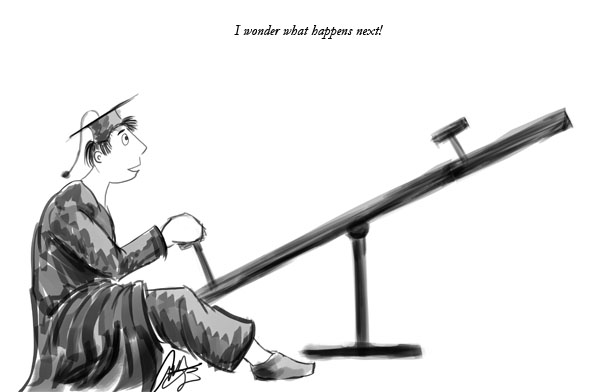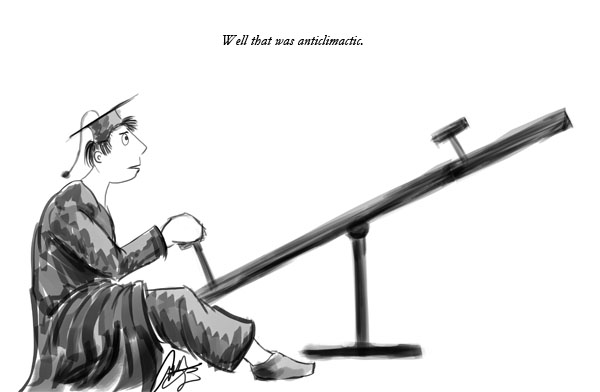I am an angsty teenager on the verge of becoming an angsty adult. Many tell me angst shouldn’t be possible at this time simply because: “SSS!” (Second Semester Senior). Thanks for the clarification — I’m all better now.
My motivational fuel reserves for tasks like planning, thinking ahead and problem-solving are running dangerously low, and as I teeter on the brink of graduation, all I really want to do is go back to kindergarten. Those were the days when my hardest choices were between Gushers and Fruit Roll-Ups, nap time or Hot Lava on the playground. The epitome of my five-year-old anxiety was when the flimsy bottom of the Crayola crayon cardboard box wouldn’t stay closed, and I’d perpetually shove the same stubby, fragmented black crayon in one end and proceed to watch it fall out the other.
At age five, every problem, action or thought was confined to the blissful present. But since those simple days, we have grown up in a community that measures all actions according to future success. In school, we rehearse and groom a single future that is college. Up until now, I thought the two — future and college — were synonymous.
Now that I am about to graduate and have been accepted to college, I have this sense that I’ve reached the zenith of my life’s work. Our culture makes us believe that this (getting into college) is it, everything we’ve worked for. But it isn’t; there’s so much more to come.
Cue the angst.
I point my finger at the language of the education system. That’s right, we’re going to talk grammar. First, school’s language relies too heavily on the future and subjunctive tenses (the grammatical tense that doles out doubt — or “duda,” as my Spanish teacher Josep Vericat taught me — through woulds and shoulds and speaks about the unknown) in establishing nebulous and ambitious goals. While using predictive and possibility-oriented language in discussing our futures, schools advocate a very limited means (namely college) for realizing this possibility. Only given a single avenue to tackle all the “duda”, our future loses a sense of attainability and gains menace.
Once I graduated from the worry-free, handball-filled days of elementary school, my responsibilities were to nurture a healthy GPA and learn to pass a test. Extracurriculars were thought of in terms of enhancing my college application and every year future-focused talk rendered my life’s purpose to a four-year chunk of time following high school. As students, we wrap our actions, beliefs and even identities around college: it seems like the universal solution to becoming our eventual beings. The culture I have grown up in makes college the checkmate of the chess game instead of the first move where options are being assessed.
It’s because of the words we’ve been given that we face the colossal expectation that somehow we will become adults with passions and jobs and maybe even kids without a clear understanding of how and when that will all develop, as we have ignored adulthood for college. So while I attempt to embrace my SSS status and its “don’t even try to give me homework” attitude, I find that I actually use the status to deny my new source of angst: the rapidly approaching, daunting and inescapable future that no #SSS can actually ward off.
This is where the grammar really plays its part in forming misconceptions about the future. The future tense, while a tool to plan, and the subjunctive, a tool to imagine, make my present actions separate from eventual outcomes. In his 2012 TED talk “The Dark Side of the Subjunctive,” classicist Phuc Tran argues that the subjunctive harbors a sense of security in allowing for possibilities and nuanced options for the future. Translated to my current state of angst, however, I find security in my near and dear future in college rather than the anxiety-inducing fog of nuance and possibly.
As a culture we are nearsighted when it comes to discussing the future: College is concrete and in fine detail and everything else that comes after blurs and fades into the background through the future and subjunctive tenses.
So here I am, a duped SSS, shrugging off classwork as I bask on the senior deck, aware that my future at an extraordinary university is just around the corner, and nonetheless brewing an overwhelming sense of dread because grammar misidentified the nature of the journey to reaching our goals.
While this tunnel-vision got me to the intended destination, I feel as though I’m ominously approaching a “Wizard of Oz”- sized tornado that will plant me straight into the fray of adulthood and life without a pair of ruby-red slippers (or, in my case, a pair of beaten up Birkenstocks) to transport me back to childhood.
This feeling of being riddled with doubt is reminiscent of my convoluted years in Spanish classes. With the intricacies and nearly imperceptible changes in conjugations, there was a whole lot of “duda.” Instead of fretting, we intentionally spoke in the tense we were familiar with and confident about: the present tense.
We forgot the subjunctive and the future, the progressive and perfect tenses. We especially let go of the conditional perfect progressive.
Señor Vericat still understood us and we were angst-free.
That’s the lesson for this moment: While the future can be intimidating, and “duda” will always exist, the answer is to trust in the present that the future will be okay.




